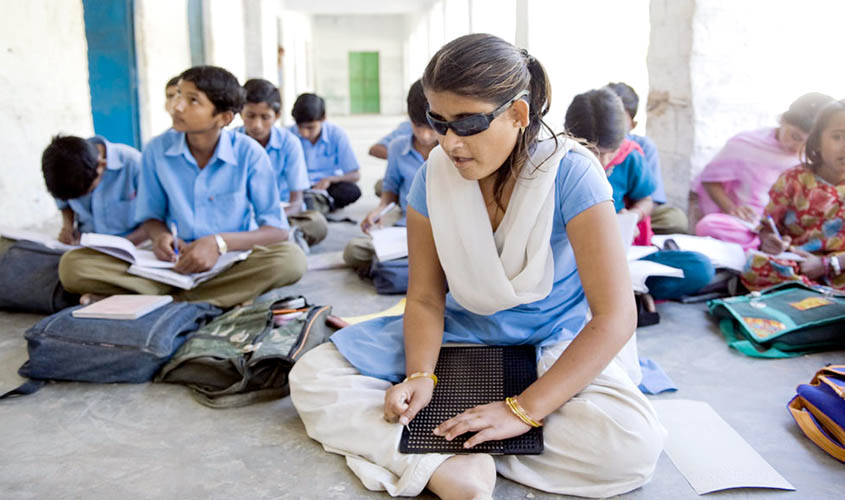Inclusive education for the specially-abled is one of the most effective ways through which we can move towards a just society that is more sensitive to the needs of the less fortunate among us.
Our society is developing at a rapid pace, the message that needs to be delivered among the people is of social acceptance and inclusion along with creating an environment that is supportive for the learning of people with any form of disability. A socially inclusive society is one in which all people enjoy the same rights and where no one experiences any stigma and discrimination. In India and around the world, many times, people with disabilities are denied the right to go to school, find a job, access health care and take part in political processes. Addressing this very issue and to propagate the idea of inclusivity, Sightsavers supports comprehensive education and social inclusion to ensure that children who are blind or visually impaired are included in mainstream education and people with disabilities such as blindness or visual impairments have an equal right to achieve their full potential, just like everyone else. This is crucial to boosting the confidence of the people with any form of disabilities and making them an equal part of society.
Importance of inclusive education
India is home to nearly 8 million blind people, which is approximately one-fourth of the total blind population in the world. Inclusive education enables children with disabilities to realise their rights, facilitating their participation in, and contribution to society; supports poverty reduction and can tackle discrimination through social integration.
The vision we want to inculcate in the society is for them to practice a system of inclusive education that will ensure people with disabilities to have access to equal educational opportunities. People may be born without a completely functional organ or senses but that shouldn’t deter anyone from leading a life of independence and dignity.
Holistic education of children with visual impairment is necessary, as when children with disabilities participate in mainstream education on an equal basis with other children, they learn from an early age that they are valued members of society. A plethora of initiatives are taken by the government and NGOs to ensure people with any form of disability are registered in mainstream schools. Moreover, the practice of inclusive education in schools helps them to participate more actively in general community activities throughout their lives and will promote social acceptance.
Now, the challenge is to ensure learning outcomes, to find the right teacher that is skilled to teach children with disabilities and to create an environment that is supportive of the learning of children with visual impairment. For inclusive education in India to succeed, training of specialist teachers is required. Assistive devices and accessible educational material should be made available, provision of compensatory skills training, suitable infrastructure, better accessibility and building education management and leadership among others for people with visual impairment are of primary importance. Our government should demonstrate scalable, cost-effective approaches to education for children with disabilities.
Need for socially inclusive society
Change is the only constant, hence change in the attitudes of communities, schools and governments by ensuring they adopt socially inclusive policies towards people with disabilities is an important step for making a disabled-friendly India. For a socially inclusive society, it is required to equip disabled people with skills; tools and assistance they need to earn a living and lead an independent life. Access to digital platforms and technology has made it easier for people to learn, adapt and upskill technologically in the recent years. It has created more opportunities and new possibilities for disabled in helping them overcome discrimination, for example, a visually impaired person can now listen to audiobooks and learn. As citizens of this society, we should encourage people with disabilities converse with other children to be active participants in society. For the development of the society, a standardised approach is required for mainstreaming inclusive education and disability inclusion.
We all have to create an environment to make our society more aware and discrimination-free for people with disability. And the situation
It is important to create an environment where disabled can equally participate in the society and share classrooms with other children in a mainstream education environment from an early age. This can be achieved when we take a step forward to create an inclusive society, where everyone including people with disability (PwDs) are treated alike with equal opportunities and pay. It is crucial to uplift the disabled’s confidence and send a message to the society that how there are no limitations for people with visual disability.
The author is director-funding and marketing, Sightsavers India

